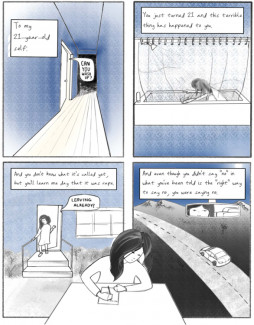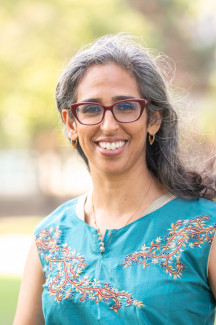
Johns Hopkins UniversityEst. 1876
America’s First Research University
Journal of Asian American Studies takes home CELJ Award

At the Modern Language Association's (MLA) annual conference earlier this month, the Council of Editors of Learned Journals (CELJ) announced the winners of their annual awards competition. We are thrilled to announce that the February 2021 issue of the Journal of Asian American Studies was named Best Public Intellectual Special Issue. This award is given to the scholarly journal that best "reaches out beyond academe and connects with a popular audience in terms of accessible language and attractive presentation…seeking to achieve the democratic mission of higher education."
The issue, titled #WeToo: A Reader, focuses on racialized sexual violence, and was guest edited by erin Khuê Ninh and Shireen Roshanravan. We asked both to describe the process of curating such an important and daring collection of writing.
What is your specific area of research? What brought you to your area of academic focus?
Shireen Roshanravan: My research focus is on the affective and communicative dimensions of cross-racial feminist coalition building, particularly the affective difficulties of aligning one's espoused politics with how one lives one's life. My own model-minority racial formation as a peculiar South Asian American moved me to seek political company with other women of color from different communities. In doing so, I came to learn quickly the complexity of committing to a process of coalition-building that challenges habits of feeling.
erin Khuê Ninh: I've always worked on what I've come to call "model minority subjectivity": centering the kind of "stereotypical" second-generation life that tends to be either denied as a "myth" or dismissed as too "privileged" to be of interest. Think college-bound or professionally-oriented kids, raised to be high-income hyperachievers. When I started teaching about sexual violence, I felt like the same kind of denial and dismissal extended to model minority experience of rape culture--and the harm this did to my students' chances of being able to make sense of their own experiences was unacceptable.
How did this special issue come about? / How did you come to be guest editors of the issue?
We proposed this collection to JAAS knowing it would be a marked departure from the journal's heretofore consistently scholarly issues. But we also knew Asian American studies to be a fundamentally community-engaged field, whose highest priorities include social change and whose roots were in art and activism as well as academia. So we figured the journal would actually be the perfect partner for a project this urgent, because we'd be able to drop #WeToo right into the middle of a conversation among experts, who'd be able to gauge instantly its novely and its need.
From beginning to end the journal's support has been incredible. Whether we were asking for a little more time or a little less, communication was on point, and we went from CFS to publication in a little over a year.
Was there a call for papers for submissions on the topic?
Yes, and in fact it is still up! https://wetooreader.wordpress.com/
We had to rethink the formatting/presentation so that it would be more appealing and user-friendly than the typical CFPs is... Artists and creative writers being our target audience, we felt it would not work to circulate a single-spaced PDF.
This issue was put together in partnership with the Asian American Writers' Workshop (AAWW) and additional pieces for the topic/issue have been posted to the AAWW online literary magazine, The Margins. Did this partnership allow for work to be added to this collection after the journal’s print deadline, or feature multimedia in a way that print could not carry?

We are so fortunate and grateful that AAWW approached us with this partnership! Jyothi Natarajan and her crew of poetry editors brought a whole other level of editorial sophistication to #WeToo's poetic pieces, and to have been able to provide their expertise to our writers ... was like having fairy godmothers on call!
But yes, with their added curation we were able to include, in the expanded collection, Margaret Rhee's speculative fiction piece (both Margaret's work and speculative fiction having been things we hoped from the beginning that we would have!). The Margins was also able to pair our textual pieces with images of Catalina Ouyang's art installations, which are such evocative meditations on the body, the feminine, as well as horror, trauma, and a sense of the abject. Also, the partnership makes it possible to direct you to the Margins' version of Michelle Dinh and Bryan Trinh's graphic nonfiction piece, because it appears there in color but within the pages of the journal, only in black and white.
What was the most challenging thing about putting this issue together?
SR: It was both challenging and rewarding to get to read and respond to so many submissions that explored critical and delicate dimensions of sexual violence in careful and provocative ways. The emotional labor put forth in the submissions was palpable. It was an honor to get to engage with erin and the authors with our whole hearts and a commitment to care for each other the entire way.
eKN: The pandemic made our editorial task a kind of existential conundrum. How do you support and respect writers who are grieving or panicking? How do you possibly talk deadlines--about sexual violence--at a time like this? Is the most caring thing just to let the project go? We settled on the feeling that cancelling #WeToo would be one more loss to 2020, and maybe that wasn't what we all needed. There can be something so reassuring about seeing sentences grow, or finding the better-fitting word for things. It is the opposite of chaos, and it is such a moving toward.
But maybe the hardest single moment was a few months before the pandemic, when pitches came in. I don't think either of us was sufficiently steeled for the reading of these pieces of story, entrusted to us, one after another. The pain was overwhelming. I remember thinking, What have we done? And how do we live up to this?
What do you hope readers take away from their time with the issue?
We hope that readers take away a sense of having company and/or finding language to help navigate their own healing journeys at the intersections of race, culture and sexual violence. In many ways, the collection was driven by a commitment to take on questions and address yearnings that we've been taught to think are inappropriate or shameful or irrelevant. If the issue can affirm and empower an honest exploration of how we've come to desire or seek affirmation in ways that do not serve our wellbeing, then it can open doors to imagine and fashion an Asian American erotics that heals instead of harms.

erin Khuê Ninh writes about the model minority as racialization and subject formation (i.e., not as myth). Her monographs on the topic are Ingratitude: The Debt-Bound Daughter in Asian American Literature (New York University Press, 2011), and Passing for Perfect: College Impostors and Other Model Minorities (Temple University Press, 2021).

Shireen Roshanravan Executive Director of Equity, Diversity, and Inclusion and Professor of Philosophy at Northeastern Illinois University. She is co-editor with Lynn Fujiwara of Asian American Feminisms and Women of Color Politics (University of Washington Press 2018) and with Pedro DiPIetro and Jennifer McWeeny of Speaking Face-to-Face: The Visionary Philosophy of María Lugones (SUNY Press 2019).


